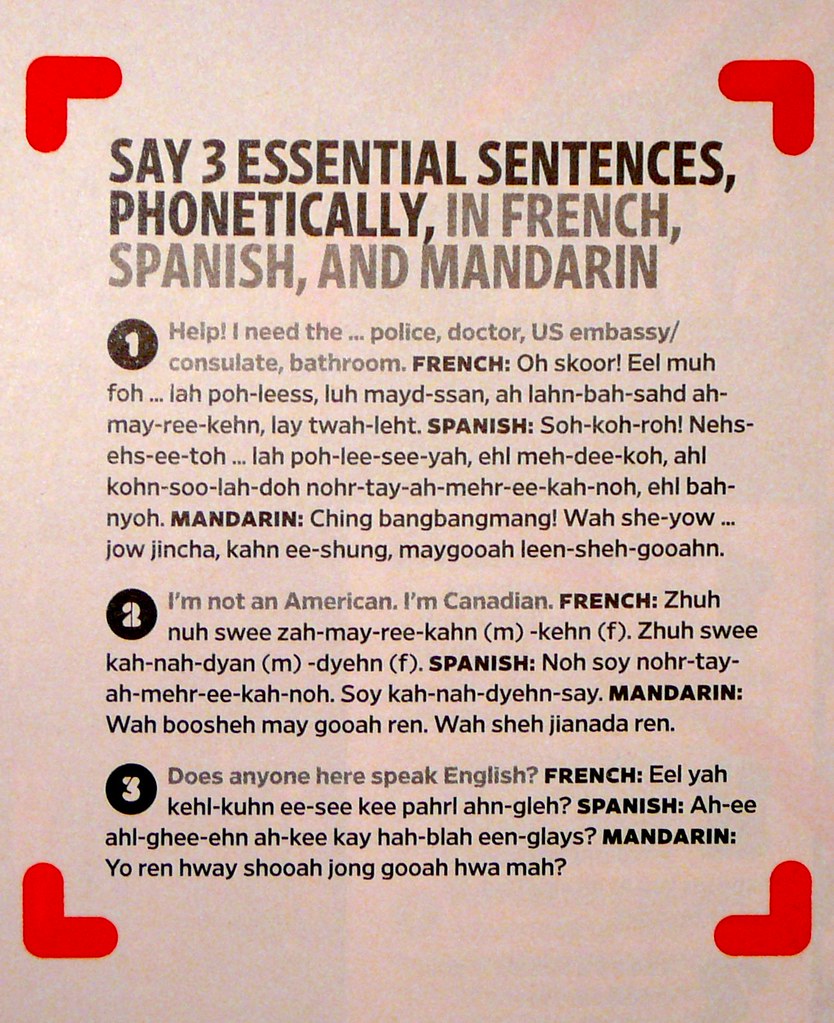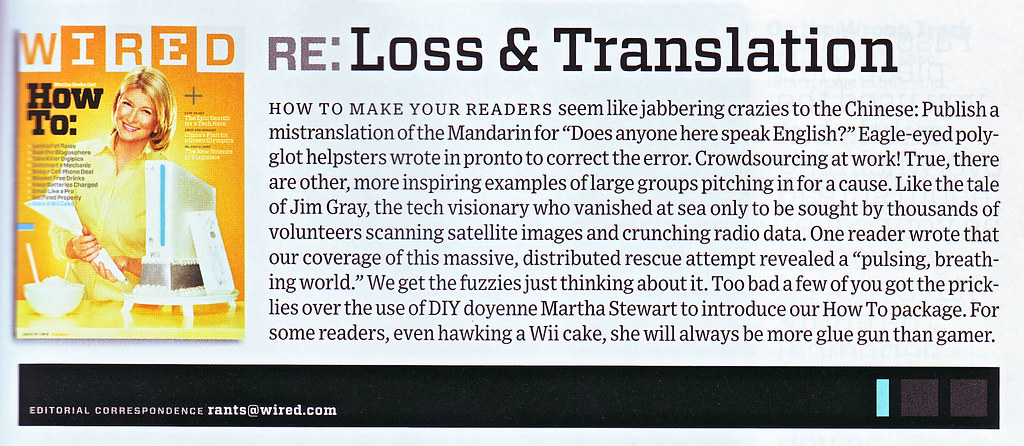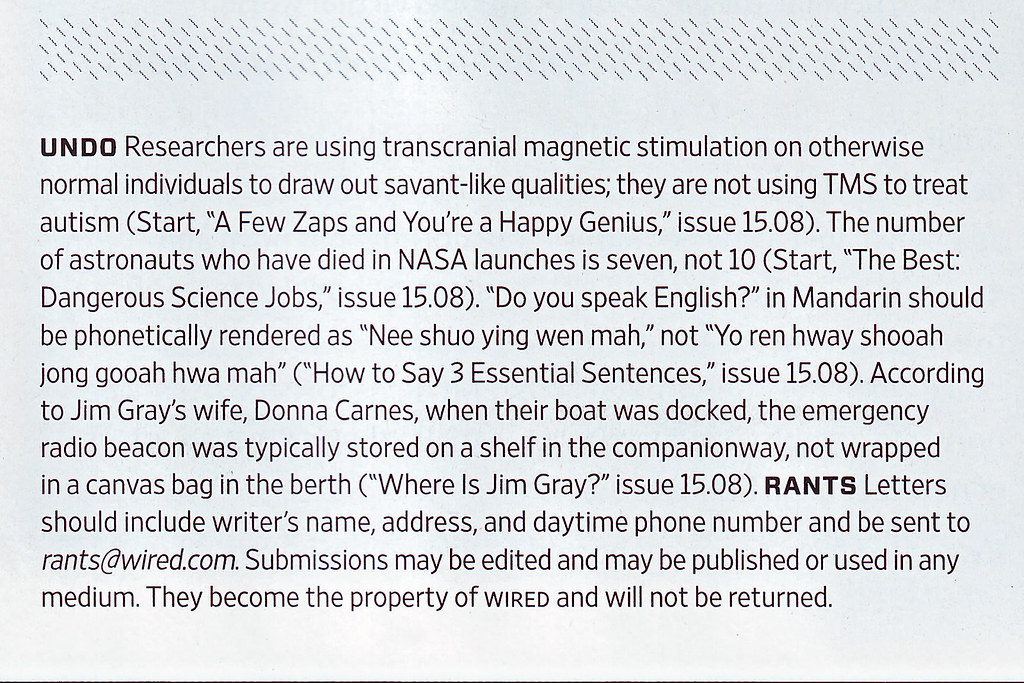In page 117, there is a small piece about "Say 3 essential sentences, phonetically, in French, Spanish, and Mandarin".

Although the Mandarin phonetics for the first two sentences are correct, the last one is not.
"Yo ren hway shooah jong gooah hwa mah?"
有人會說中國話嗎?
Actually means "does anyone here speaks Chinese?"
The correct sentence should be (in pinyin):
yǒu rén huì shuō yīng guó huà ma?
有人會說英國話嗎?
Update: Aug. 5, 2007 - Emailed Wired magazine (rants@wired.com) regarding the error, I don't know if they will do anything about it.
Update: Aug. 16, 2007 - Wired emailed me back stating they are considering to publish my letter either in print or on their website.
Update: Sep. 30, 2007 - Wired magazine has printed a correction in their Oct. 2007 issue.




It's bad in French too, Zhuh nuh swee PAA zaa-meh-ri-kain.
ReplyDeleteOtherwise, you omit the negative that says that you are not.
I'm always amazed at how bad French expressions are wrongly written in English.
Yes, I know I probably made mistakes in English. But I'm not a magazine Editor who can hire proofreaders, or simply ask a French collaborator.
Nitpick on the Spanish: I don't think anybody would say socorro. I've never heard that word used ever. What I would say is "por favor ayudame, necesito", please help me, I need the whatever.
ReplyDeleteAlso, it tells you to say "al consulado Americano" which means "to the American consulate", which is a minor difference and maybe it is in fact what you are supposed to say, but I did say it was a nitpick, didn't I?
I have always wondered if those bizarre phonetic translations of Spanish are necessary in American publications (I don't know if Wired gets much circulation outside of North America)- it has a very straightforward pronunciation and it seems that most Americans for whom this would be an issue have been exposed to enough Spanish to understand the basic pronunciation rules. For me, the phonetics were more confusing than if the real thing had been written out.
I gotta say, I love the "I am not American, I am Canadian." Gee, I wonder when that became an essential phrase?
ReplyDeleteXiao Siobhan-
ReplyDeleteI've seen socorro, but really only in books. I don't think I've ever heard anybody say it, aside from jokingly.
Trust me though, the phonetic guides really are necessary for some people. Not for most people in the Southwest region at least, but I have seen quite a few people who just don't have a clue!
The erroneous pinyin you cited in the wired article is a commonly used format to express chinese pronunciation to people who are not trained in the basic mechanics of Hanyu Pinyin.. How many English speakers out the know the difference between 'z' and 'zh" or 'c', 'q' and 'ch'?
ReplyDelete@尼克,
ReplyDeleteEven if you follow the phonetics printed "jong gooah hwa", it sounds "zhong1 guo2 hua4", which is "Chinese", where it was intended to be "English".
The Spanish for "I'm not American" is also pointless.
ReplyDeleteThey're trying to say "No soy norteamericano, soy canadiense," which literally means, "I am not North American, I am Canadian." So, yeah, considering that Canada is in North America, it sounds ridiculous. The word they're looking for is "estadounidense" (USA-ian).
Also, "Socorro!" to me sounds like saying "Save me! Save me!" instead of "Help!". Thus far I think I've only really heard it in plays or TV dramas. KF
They've also left out how to ask for the bathroom in Chinese, as well. Poor travelers in China!
ReplyDeleteAbout that last - would most people say "ce suo" (what I learned in class in an American college) or "xi shou jian" (what I actually saw on a lot of signs in Beijing and Shanghai?
ReplyDeleteIs it like "toilet" vs "restroom" in American English?
Yeah the "I'm not American, I'm Canadian" is really messed up. So, I guess what I was taught about the world was wrong and there are 8 continents :P Australia, Africa, Europe, Asia, Antarctica, South America, America (North America)and finally Canada :P
ReplyDeleteUgh. That French is making me twitch. As someone pointed out earlier, they neglected to add "pas" to "Je ne suis PAS Américain." That aside, it seems as though they may have left out syllables in some words. And I'm still scratching my head over the "ah" in "ah lahn-bah-sahd ah-may-ree-kehn." ("Il me faut... l'ambassade Américaine.") Unless they meant "à l'ambassade Américaine". Which is structurally incorrect, and makes no sense whatsoever in this context.
ReplyDeleteIn addition, like some people have said about the Spanish, I can't actually see anyone actually going to someone and saying "Au secours" if they need something.(Except maybe in the case where they're asking for a doctor.)It usually implies an emergency of some sort. Again, like someone mentioned earlier about the Spanish, it's equivalent to shouting "Help, help!" or "Save me!".
socorro is not used anymore in mexico although it is a bit more common in spain and argentina it always implys help in case of danger and in mexico you would only see it in soap operas (because they have very terrible writers) it is considered very old fashin and in an emergency you would use "que alguien me ayude" or some other variation or just policia policia or ambulancia or doctor (no time to yell idiotic constructs) if you come here to mexico and say socorro either you mean a woman`s name or you yourself are a very old woman.
ReplyDeleteif it is not an emergency a simple disculpa or disculpe would suffice before what you want for example "disculpa, el consulado gringo? donde queda" or "disculpe, el baño?"
hope it helps